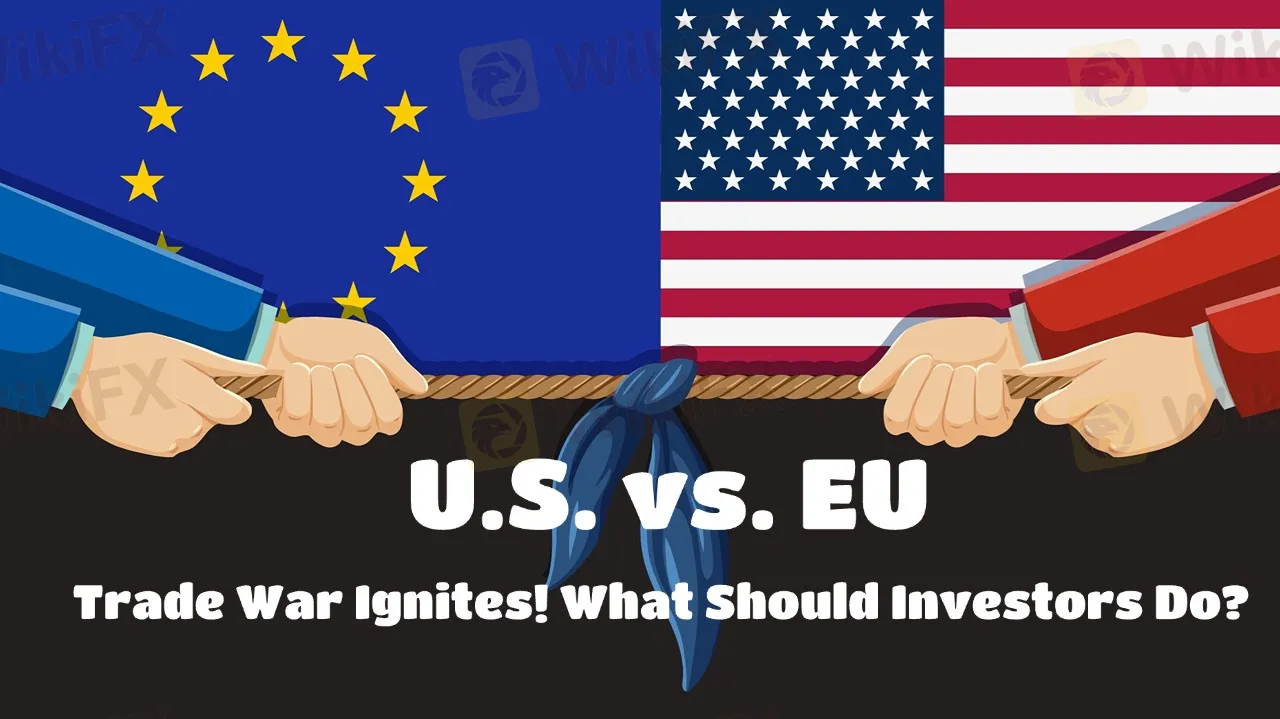简体中文
繁體中文
English
Pусский
日本語
ภาษาไทย
Tiếng Việt
Bahasa Indonesia
Español
हिन्दी
Filippiiniläinen
Français
Deutsch
Português
Türkçe
한국어
العربية
U.S.-EU Trade War Escalates: What Should Investors Do?
Abstract:The U.S.-EU trade war has officially begun, with escalating tariffs shaking the markets. Investors face significant challenges—how can they find opportunities amid the turmoil?

As the U.S. imposes a 25% tariff on imported steel and aluminum, the EU quickly retaliates with plans to impose tariffs on $283 billion worth of U.S. goods, set to take full effect in April. This tariff battle has already impacted market sentiment, with the euro slightly rising to $1.09 against the dollar.
Investors should brace for market volatility and closely monitor affected industries to adjust their strategies accordingly.
The trade war not only affects transatlantic trade but also disrupts global supply chains. The European steel and aluminum sectors face dual challenges: declining exports and increased competition from redirected U.S. products flooding the European market. Additionally, rising production costs in the U.S. could lead to higher consumer prices, further dampening market confidence.
Future Challenges and Investor Strategies
Given the current situation, investors should closely watch U.S.-EU negotiations and remain cautious about risks arising from market uncertainties. In the short term, industries affected by tariffs may experience price fluctuations, while sectors like energy and technology could benefit from trade shifts. To navigate the global market turmoil, investors must stay flexible in asset allocation to mitigate potential losses and seize emerging opportunities.

Disclaimer:
The views in this article only represent the author's personal views, and do not constitute investment advice on this platform. This platform does not guarantee the accuracy, completeness and timeliness of the information in the article, and will not be liable for any loss caused by the use of or reliance on the information in the article.
Read more

Never Heard of Dynasty Trade? Here's Why You Should Be Worried
Have you heard this name before? No , it’s time you do because staying unaware could cost you. This platform is currently active in the forex trading and has been linked to several suspicious activities. Even if you’ve never dealt with it directly, there’s a chance it could reach out to you through ads, calls, messages, or social media. That’s why it’s important to know the red flags in advance.

WEEKLY SCAM BROKERS LIST IS OUT! Check it now
If you missed this week's fraud brokers list and are finding it difficult to track them one by one — don’t worry! We’ve brought together all the scam brokers you need to avoid, all in one place. Check this list now to stay alert and protect yourself from fraudulent brokers.

Catch the Latest Update on BotBro & Lavish Chaudhary
BotBro, an AI-based trading platform, became popular in India in 2024—but for negative reasons. Its founder, Lavish Chaudhary, who gained a huge following by promoting it heavily on social media. Since then, he has become well-known, but for many controversies. Let’s know the latest update about Botbro & Lavish Chaudhary.

Trading Other People’s Money | What Prop Firms Don’t Tell You
Proprietary (prop) trading firms have become increasingly popular. They give traders the chance to trade with larger amounts of money without risking their own savings. For many, this sounds like the perfect opportunity to grow faster and earn more. But while the benefits are appealing, there are also risks and hidden rules that traders must understand before joining a prop firm.
WikiFX Broker
Latest News
WEEKLY SCAM BROKERS LIST IS OUT! Check it now
Apex Trader Funding is an Unregulated Firm | You Must Know the Risks
What WikiFX Found When It Looked Into Aron Markets
Textiles to whisky: U.K.–India 'historic' deal is set to boost bilateral trade by over $34 billion a year
Thailand-Cambodia border clashes: Cambodia's economy has more to lose, analysts say
Puma shares plunge 18% after full-year sales, profit outlook cut on U.S. tariffs
Is Your Forex Strategy Failing? Here’s When to Change
FSMA Warns That Some Firms Operate as Pyramid Schemes
Federal Reserve likely to hold interest rates steady despite pressure from Trump. Here's what that means for your money
Sigma-One Capital Scam? Investors Say They Can’t Withdraw Funds
Currency Calculator


